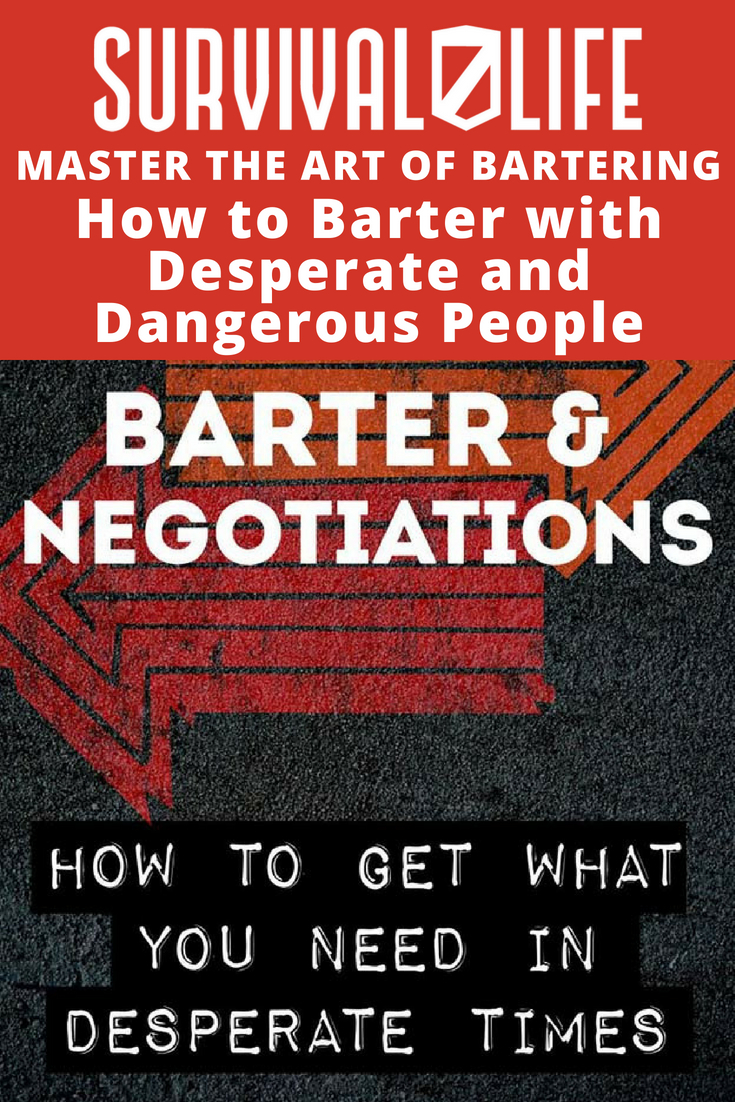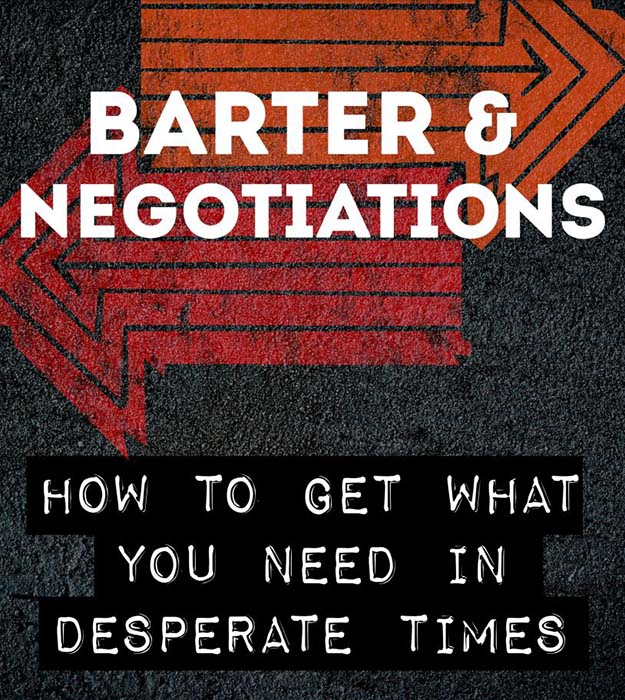Barter and Trade
How To Barter With Desperate And Dangerous People

In a survival situation, knowing how to barter to get what you need is a vital skill. Check out our bartering tips and download a FREE ebook.
How to Master the Art of Bartering
- Don’t be shy – ask for more.
- Walk away from bad deals.
- Be fair.
For some people, knowing how to barter is both an automatic reflex and a learned skill. People exchange money for goods every day without ever thinking about the true cost or value of the item they’re purchasing.
It’s unfortunate that bartering or “haggling” over prices is so often frowned on simply because current etiquette dictates that not paying the stated price of an item is bad form and trying to get a better deal will make you look “cheap.”
But why would you ever want to pay more than the absolute minimum required for an item you want?
If you would rather pay face value for everything you want and need, stop reading now. This article is not meant for you.
However, if you are less interested in keeping up with the Joneses and more concerned with getting the most bang for your buck, then read on.
Avoiding a Bad Deal
After a crisis you need to make sure you know exactly how to approach a situation and what to say or do to get what you need – without compromising your safety or giving up something you'll need down the road.
I want to start with my number one tip…
Tip 1: Never be afraid to ask for more.
I can’t tell you how many hundreds, if not thousands of dollars I have saved by asking this ONE simple question: Can you do any better than that?
I recently helped my friend shop for a new refrigerator for her home… It took a little time but I managed to find an open box fridge that had been returned with no damage. This was a $2800 appliance that had been marked down to $1800 just because some one didn't like the way it looked in their kitchen!
They also had a sale going on all appliances that took another 20% off (taking the fridge down to $1440.) I then found a coupon for another 10% off (now we’re down to $1296.)
So I asked them: “Can you do any better? I had really been hoping to get a fridge for under $1,200…”
That’s all it took. That one question saved me an additional $96.00 (well, it saved my friend some money… I got a free steak dinner out of it.)
Tip 2: Walk away.
The worst thing someone can say is NO. And that’s okay.
If they say no and the price is higher than you’re willing to pay… simply walk away. Walking away is sometimes an even more effective negotiation tactic than standing there and arguing with them.
If you want to see all of the tactics I use to negotiate a better deal, click here NOW.
I’m giving you access to my special report Barter and Negotiations: How to Get What You Need in Desperate Times.
It’s yours FREE. Just click the link above and download it. I wrote this exclusively for the Family Protection Association, and you’re only getting access to this for being a member of Survival Life.
If you like what you read, please consider becoming a member of the FPA… you won’t regret it.
Click here to see everything the FPA has to offer.
Tip 3: Be fair.
I do need to caution you on one thing…
It is incredibly important to remember that while it may be possible for you to influence people to give you the things you want for far less than they want, you may need to work with these people again.
Being fair in your tactics will prove to be beneficial in future dealings, just as taking advantage of those less skilled in the art of bartering will usually end up hurting later exchanges.
The best-case scenario is for both parties to leave the table satisfied that they got a “square deal.”
Click here to download your report and continue reading.
Can you think of a time when bartering helped save you a chunk of change? Let me know in the comments!

For awesome survival gears that you can't make at home, check out the Survival Life Store!
To learn more about bartering, check out the series below:
Priceless Bartering Chips: Part 1
-

 Paracord Projects1 year ago
Paracord Projects1 year agoParacord Projects | 36 Cool Paracord Ideas For Your Paracord Survival Projects
-

 Paracord Projects1 year ago
Paracord Projects1 year agoHow To Make Paracord Survival Bracelets | DIY Survival Prepping
-

 Medical Care1 year ago
Medical Care1 year ago21 Home Remedies For Toothache Pain Relief
-

 Knife Laws1 year ago
Knife Laws1 year agoAre Switchblades Legal? Knife Laws By State
-

 Do It Yourself1 year ago
Do It Yourself1 year agoSurvival DIY: How To Melt Aluminum Cans For Casting







Pingback: How To Barter With Desperate And Dangerous People | Savvy About Survival
Bev King
September 24, 2016 at 11:18 AM
Having operated a music store for 15 years, I’m well aware of tactics customers use. If they were nice about it, yes, I would either throw in some extra small items or lower the price (of course that depended on the item…what it cost originally, how much I had in it, how long I’d been trying to sell it, etc. If I had just gotten it in that morning and it was something I knew would sell, I might not come down at all). But if a customer was rude, that ended the negotiations. The one phrase that always caused me to just walk off was “if you’ll come down off your price” because that told me they thought the item was overpriced (and my prices were usually a good bit lower than any of my competitors, including WalMart when the local store sold instruments). I really didn’t like hearing “what’s your bottom dollar on this?” and I usually would give a price a good bit higher than my actual bottom dollar. If they would make me an offer, I might take it, or I might counter offer a bit higher, or I might have to reject it completely. Really, it had a lot to do with the customer’s attitude. There was one guy who was always insulting, telling me I had nothing but junk, and would offer me about 10% of the tag price…and would tell me he used to have a store so he knew what I paid for all this (so if he thought my cost was only 10% of what I’d tagged it, he must have really been cheating his customers!).
Cliff A
September 24, 2016 at 10:51 PM
To barter with desperate people and or dangerous people need to be handled differently than what this story has offered you. The first thing you need to realize is that conditions are not normal nor safe. Remember this rule, “supply and demand” always win out. This is to say that if you have the supply then you set the rules on how you will deliver the goods despite the conditions. This may mean that you may have to take drastic measures to ensure your and your family and employee’s safety and well being.
Lets say for kicks and giggles you own and run a mom and pop store. The SHTF in your neighborhood and a lot of people are running into your store to resupply their homes. What do you do? If you let a bunch of these people come in they may try and ransack your store without paying. You definitely can’t barter with these people. What if several people come into your store to rob you. You will either get hurt or killed or you hurt or kill the intruders. There is no bartering with these fools.
So lets say that you managed to have a store with proper security and you let people in one at a time. Now the supply and demand comes into play. You want high quality items or service at a low price. If you go into a pawn shop they will give you $10.00 per carrot on your diamond ring. Don’t believe me? Go check it out and see. Conditions are normal and that is what they are asking. You want to buy low and sell high. Now if you set yourself up to do business this way, you are also setting yourself up for animosity and hard feelings within your customers and quite possibly with your community. Now if you don’t care then power to you. But remember, what comes around, goes around. Meaning that you may need to depend of someone else for a specific item, food, service or even medicine. Then you will be at their mercy.
So what do you need to do? If you have to barter for a specific item, food or service; try not to be desperate, at the very lease look or act like you are desperate. Try to have other sources that you can get your supplies from at the price that you are willing to pay. If you can, try and go with out by creating alternative ways of making or getting what you really need. If you treat your intended client with respect and fairness, they will always remember that you were decent about the barter, perhaps you created a form of trust with your reputation as be fair and honest. Even dishonest will come to rely on this as a standard when dealing with you – even if they will try and take advantage of you and your good business sense. Be hard, be firm, but be honest.
Finally, if you do a tit-for-tat barter even better for you. Remember, kids use to trade their baseball cards with out thinking of the true value of the card. You need to have that kind of mind set. I need this now to help me survive, yet I am willing to let this go at a sever discount. (I have never seen a person eat gold, silver or the land that they own.) They may have all the money in the world; but just try and eat it. It is the farmer that will survive because he can grow his own food and has a supply that he can control. This is why the barter system seems to work. So rule three is this: know the value of the item you are bartering for and the item that you have to barter. This way you will know if you are being taken advantage of or you an ask for more to be thrown into the pot. And rule number $ – if it don’t feel right, then it isn’t right. This means that if you don’t feel it is right (for any reason) then stop what you are doing and go over your barter. See where you don’t feel right about your barter. Perhaps you want more for the item or service you are bartering. Whatever the case may be, do your barter with an idea of what you want out of it, don’t go with hat in hand expecting a handout or a freebie at a discount.
Use extreme caution when dealing with desperate and dangerous people. They will try and take or take advantage of you in any which way they can. Be safe, surround your self with people that are willing to protect you should something go wrong and make any exchanges in a safe place with lots of people or better yet at a police station. Don’t let a person take off in your car, motorcycle, or truck without you taking their driver license and riding along with them. Make the test drive short and sweet. And most of all have the vehicle look at by a qualified mechanic. You can propose to split the cost with the other party. If you walk away, you can at lease let them have a copy of the mechanic report if they pay for it. If they don’t want to split the cost then keep the report to yourself and make your decision. accordingly.
Pingback: 11 Underrated City Survival Skills You Should Know in the Urban Area - Survivalnomics
Pingback: 11 Underrated City Survival Skills You Should Know in the Urban Area | Best Go Bag
Pingback: Bartering To Survive With Creek Stewart [PODCAST] – Bulletproof Survivors
Pingback: Bartering To Survive With Creek Stewart [PODCAST] – Sprent Brass